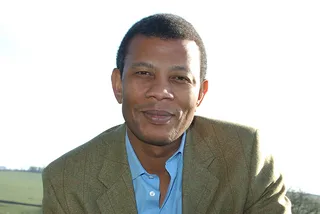
Resetting the Mindset: Wilfred Emmanuel-Jones on Black History Month
With the arrival of Black History Month 2018, we reflect on last year's monumental celebration. 2017 marked a special anniversary - 30 years of Black History Month in the UK. The theme was Resetting the Mindset, which focused on tackling the conscious and unconscious bias within our cities and communities. Last October we chatted to farmer and founder of the Black Farmer brand Wilfred Emmanuel-Jones to find out his views on diversity , how we can tackle inherent racism and how the Black Farmer products have helped to challenge traditional conventions.
What does BHM mean to you?
Black History Month is really important, as it allows the citizens of the country to get a better understanding of Black contributions to British history. As all too often they are sadly forgotten. The month is a great opportunity for people to be reminded that a lot more can be done on the race issue. Personally, I want to see more businesses behind the cause. I think, the only way that that it will survive, will be when we get host communities on board with it - so this means influential white groups and the private sector. It is an important thing to be seen to be getting behind, and we need more people to support the initiative.
Can you tell us about the Black Farmer products and initiative and how this challenges race, convention and tradition?
I launched the Black Farmer brand over 10 years ago, the idea was that I wanted it to be a mainstream brand, one that sees itself as a firmly British brand , that is part of our culture. I want the brand to be able to help ethnic minorities break out of stereotypical areas and careers they may usually go to, such as sports and music etc. I wanted to demonstrate that actually we love the British countryside and we love farming, we do feel an affinity to things that are traditionally English. I feel that Black Farmer is a modern day quintessential British brand.
"The whole point is to demonstrate to people of colour that working in the rural community is an option available to them."
The whole point is to demonstrate to people of colour that working in the rural community is an option available to them. Amongst diverse communities, there tends to be a feeling that it is not for them, and I want to try and break down those barriers. A lot of people from diverse backgrounds have parents who are from rural backgrounds, this is the case for me, for example, I was born in rural Jamaica – so this kind of living is in my blood. I want to offer ethnically diverse people the opportunity to live and work in rural Britain.
How can we help to tackle conscious and unconscious bias against race in our cities and communities?
There is of course a prejudice. It is about making landowners more responsible. What a lot of people don’t understand is that as well as a lot of farming land being owned by families that go back generations, there is a lot of land owned by local authorities such as the church and councils.
People that lease land are usually from traditional institutions. So, we should challenge these authorise to demonstrate diversity, and ask them, how much of their land are they renting out to diverse communities, and what are they doing to make changes? We need to spread that word that if you are a young person looking to get into farming without the money to buy land, you can rent it – we need to challenge the authorities to demonstrate diversity.
"We need to spread that word that if you are a young person looking to get into farming without the money to buy land, you can rent it."
What can politicians do to help with the issue of diversity in politics?
One of the problems with the diversity argument is that diversity covers a multitude of people and genders. From my perspective, diversity has been hijacked by gender issue. The reason this has happened is because the gender problem is easier to address than race one. But, dedicating a month to Black history is a good way to separate race from wider diversity debates and help people to realise it is an issue in its own right.
My view about diversity is that it works in organisations when people at the top take the lead, it is no good saying you are ticking the relevant boxes by having a diversity officer, the problem needs to be solved from the top down. It is really about what leadership are personally doing to demonstrate their commitment. I would like to see more CEOs signing up to have people from diverse communities do 6-8 weeks of work placements in their companies. This would help to get ethnic communities into these corporate environments or places they wouldn’t typically work. If CEOs do this, it will be taken seriously within the company and not just be seen as box ticking without any real commitment.
One of the things we should do in BMH is not only understand Black contributions to British history and how we have helped to develop this country, but also to use this month as a platform to challenge organisations on their initiatives.
To book, or for more info. on any of our speakers, call us on +44 (0) 20 7607 7070 or email us at info@speakerscorner.co.uk .
Have an enquiry?
Send us a message online and we'll respond within the hour during business hours. Alternatively, please call us our friendly team of experts on +44 (0) 20 7607 7070.
